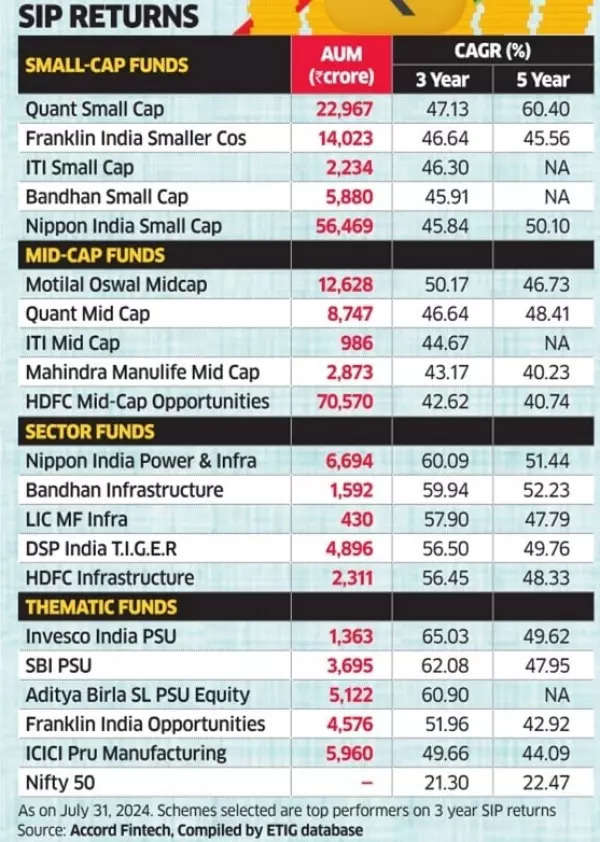
In contrast to the 21.3% return generated by an SIP in the Nifty 50 index over the last three years, many of the top sectoral funds, as well as small and mid-cap funds, have delivered returns exceeding 45%, according to an ET report.
Thematic funds, particularly those focused on PSUs, experienced a significant surge due to their holdings in stocks from sectors such as defence, railway, banks and power finance companies, while infrastructure funds performed well as a result of a recovery in the capital expenditure cycle, supported by strong performances from stocks in the capital goods, power and infrastructure companies.

SIP returns
What should investors do?
However, fund managers advise equity mutual fund investors to avoid investing in schemes solely based on their past high returns. Instead, they recommend focusing on areas with reasonable valuations and considering hybrid funds that diversify across multiple asset classes.
Recently, investors have been allocating significant amounts to schemes that have delivered high returns. According to an ET report, Franklin Templeton data reveals that over the past year, investors have allocated Rs 1.52 lakh crore, or 59% of the total equity inflow, to a combination of thematic, small-cap, and mid-cap funds.
Also Read | Jim Rogers warns: ‘America & world long overdue for a problem; next market sell-off will be…’
Value Research data shows that small-cap and mid-cap fund categories have generated average returns of 51.86% and 53.29%, respectively, over the past year. Thematic funds, such as CPSE ETF, Bharat 22 ETF, and defence funds, have yielded returns ranging from 100% to 124% during the same period.
However, wealth managers caution that investors may suffer losses if they chase past top performers. A study conducted by Whiteoak Capital MF over the past 19 years revealed that an investor who initiated a SIP in a mid-cap or small-cap index fund in April 2005 and remained invested in the category for 19 years would have achieved higher returns compared to an investor who annually switched to the best-performing category of the previous year.
Also Read | Should Sensex, Nifty investors be worried about possible US recession? Here’s what experts say about India
The study showed that an investor who started with a SIP in a mid-cap fund and subsequently switched to the best-performing fund of the previous year at the beginning of each financial year would have earned an average annual return of 15.5%. In contrast, if the investor had maintained SIPs solely in the mid-cap index fund, they would have achieved an average annual return of 18.1%.
Neelesh Surana, chief investment officer at Mirae Asset Investment Managers, cautions, “Investors should avoid thematic investments based on latest trends like defence, manufacturing, and infrastructure, as the underlying stocks have already seen significant re-rating in the past two years.”
For new investors, hybrid products may be more appropriate, especially given the current market conditions. Core SIP investments can be spread across large-cap, mid-cap, flexi-cap, and multi-cap categories to ensure exposure to all sectors, according to Surana.








